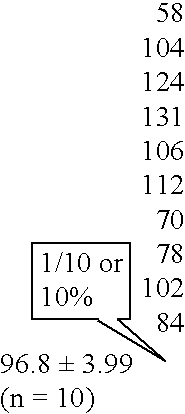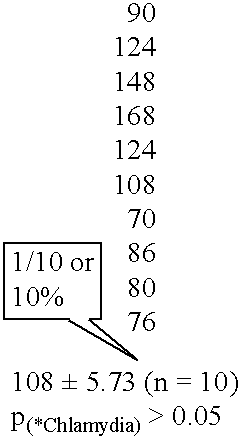Treatment of atherosclerotic disorders
a technology for atherosclerosis and atherosclerosis, applied in the direction of immunoglobulins against animals/humans, drug compositions, cardiovascular disorders, etc., can solve the problem of high atherogenicity of immune complexes, and achieve the effect of lowering abzyme activity
- Summary
- Abstract
- Description
- Claims
- Application Information
AI Technical Summary
Problems solved by technology
Method used
Image
Examples
example 1
[0185] IgG was extracted from an atherosclerotic lesion in a patient using the method described above. Anti-Chlamydia antibodies were found to be present in this IgG fraction (FIG. 1).
[0186] The ability of the extracted IgG fraction to oxidize lipid was determined. The IgG fraction was shown to cause a peroxidation of lipids in both ovine and feline strains of Chlamydia psittaci (table 1). Kinetic analysis of this peroxidation reaction showed that the reaction had an enzymatic character (FIGS. 2, 3). Chlamydia bacterium can therefore be considered as a substrate for their antibodies extracted from human atherosclerotic lesion.
[0187] The epitopes for anti-Chlamyidia abzymes were investigated further using non-ionic detergents. Treatment of Chlamydia with Triton X-100 or Igepal CA-630 abolished the oxidation of the lipids in the bacteria by the extracted abzymes. Similar results were obtained for the treatment of human serum low density lipoproteins.
[0188] This provides indication tha...
example 2
Inhibition of Lipid Peroxidation
Human Specimens
[0199] Antibodies were extracted from advanced atherosclerotic lesions of human aorta retrieved from four male patients, age range 53-64, during bypass surgery of an abdominal aortal stenosis at the Centre of Cardio-Vascular Surgery of Clinical Hospital No.1 in Rostov-na-Donu, Russia. After recovery these samples were immediately put in 30% w / v solution of NaCl and stored at 0-4.degree. C. for 1-2 weeks prior to examination.
[0200] In control experiments, it was shown that during this period the activities of such enzymes as trypsin, catalase, superoxide dismutase, glutathione peroxidase, creatine kinase and lactate dehydrogenase, together with a level of immunoglobulin (IgG) fragmentation and the degree of lipid peroxidation (concentration of malonaldehydes) did not significantly change.
[0201] The pieces of aorta (approximately 200-400 mg wet weight) were cut into pieces of approximately 10 mg each, placed in 5.0 ml of PBS with 1% non-i...
example 3
Clinical Example of Reduction in Lipid Oxidising Anti-Chlamydia Antibody Activity
[0219] Patient--A. M. P., Caucasian, male, 43 years old, having clinical symptoms resembling the early stages of angina pectoris with complaints of transient unprovoked chest pain in combination with breathlessness. However, an ECG revealed no pathological changes in the heart.
[0220] The results of a blood test on Dec. 27, 2000 revealed normal total cholesterol and LDL-cholesterol levels; titers of anti-Chlamydia IgG and IgA antibodies were both 1:64 (ELISA, Medac). However, lipid-oxidising anti-Chlamydia abzymes were detected and their activity was 32 .mu.M MDA (mean figure of triplicate measurement) per 1 ml of his serum.
[0221] The following daily treatment, over the course of three months, was recommended: Tetracycline hydrochloride 500 mg,in combination with an antioxidant cocktail--Vitamin E 20 mg, Vitamin A 1.5 mg, Vitamin B6 3.2 mg, Ascorbic acid 180 mg, Zinc Gluconate 30 mg, L-Selenomethionine 1...
PUM
| Property | Measurement | Unit |
|---|---|---|
| wet weight | aaaaa | aaaaa |
| wet weight | aaaaa | aaaaa |
| volume | aaaaa | aaaaa |
Abstract
Description
Claims
Application Information
 Login to View More
Login to View More - R&D
- Intellectual Property
- Life Sciences
- Materials
- Tech Scout
- Unparalleled Data Quality
- Higher Quality Content
- 60% Fewer Hallucinations
Browse by: Latest US Patents, China's latest patents, Technical Efficacy Thesaurus, Application Domain, Technology Topic, Popular Technical Reports.
© 2025 PatSnap. All rights reserved.Legal|Privacy policy|Modern Slavery Act Transparency Statement|Sitemap|About US| Contact US: help@patsnap.com



